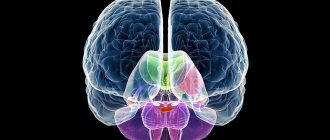Why is the nervous system needed?
The human nervous system performs several important functions at once: - receives information about the external world and the state of the body, - transmits information about the state of the whole body to the brain, - coordinates voluntary (conscious) movements of the body, - coordinates and regulates involuntary functions: breathing, heart rate , blood pressure and body temperature.
More movement
Movement is a natural human need. Find out how much you need to move for a good state of the nervous system.
As already mentioned, exposure to stress can cause negative effects on the entire human body. To be able to minimize this impact, you need to know how to relieve this stress. First of all, you need to know that stress develops gradually; and this means that it can be stopped in time, without bringing our nervous system to extreme overstrain.
In modern psychology, there are 3 physiological stages in the development of stress, let's figure out what each of them is.
First stage. Let's imagine that you learned some news that really excited you. At this moment, a certain intense focus of excitation is formed in the cerebral cortex. This focus affects all human activities - thoughts, actions, actions. In order to calm down, you need to get rid of this focus, the best way is to create another focus, switch to something else. This is suitable for watching a movie, reading an interesting book, meeting with friends, doing your favorite thing. Those. everything that can occupy your thoughts and distract you. The more interesting the business you are doing, the easier it will be to bear the exciting news, i.e. You will “extinguish” the so-called hearth and perceive the situation less emotionally. After all, as you know, at first we always react violently to something, but after a while we calm down and understand that not everything is so bad, and we react more adequately. It’s good if you have some kind of hobby, in this case you will receive much more positive emotions that will help eliminate the source of excitement and relieve stress.
Second phase. If the focus of excitation is not removed, then a chain reaction occurs and the hypothalamus is excited. After this, adrenaline and other physiological substances (stress hormones) are released into the blood. Under their influence, the heart begins to beat faster and more often, and blood pressure rises. This condition is very dangerous, because the heart or head can hurt, you can lose consciousness, some people begin to choke, and even heart attacks occur. Also, in this state, people can take out their anger on things, sometimes on other people (then a fight occurs). This is due to hormones that are still present in the blood - stress hormones and adrenaline. They provoke the emergence of excess muscle energy, from which the body needs to get rid of. Accordingly, at this stage, in order to get rid of stress hormones, you need to engage in physical exercise or sports; in general, any physical activity (especially intense) will help you with this.
Third stage. You have already calmed down a little, but the situation remains unresolved, as a result of which stress hormones continue to flow into the blood. At this stage, the conflict must be completely resolved. The best way is to make peace with the person with whom you had a quarrel, or to understand the current situation; perhaps you misunderstood something. In a word, you need to make sure that this problem is completely solved for you. You need to find positive aspects in what happened or convince yourself that “it could have been worse.” A good way to calm down is to communicate with loved ones; you need to “pour out your soul” to someone, talk it out, resentment should not accumulate inside you. If hatred or resentment accumulates in us, if we do not resolve situations that worry us, if some thoughts or doubts gnaw at us, then this “eats” us from the inside, we spend our internal energy on these experiences and fade. Therefore, you need to find the strength within yourself and resolve the conflict.
Hatred increases as a result of mutual hatred and, on the contrary, can be destroyed by love... Benedict Spinoza
Thus, stress develops in 3 stages and depending on what stage a person is at, there are ways to relieve it: doing what you love, physical activity, conflict resolution (finding positive aspects, talking with the offender, self-hypnosis).
As www.medicinaportal.com/category/health writes, it is best not to even reach the second stage, this will help you maintain your health and not make mistakes (at the second stage, when there is a lot of adrenaline in the blood, it is much more difficult to control yourself!). But anything can happen. If you have a quarrel with someone, you will still have to resolve the conflict, but it is much easier to do this in a calm and adequate state. And don’t confuse stress with depression or lack of mood; these are still different things. I have already written about how to cheer yourself up, I advise you to read it, because... there you will find several more ways to help you relieve stress.
So, in this article we learned how to relieve stress and that there are 3 stages of its development. Finally, I’ll give you one more piece of advice: you don’t need to remember unpleasant situations, replay them in your mind, or think about “what would have happened if...”. This will not lead to anything good, because... You will again experience negative emotions. This is a proven fact! Better remember pleasant moments and create new positive emotions for yourself and others! By the way, laughter is one of the ways of psychological release, and it also relieves anxiety, remember this!
How is it structured?
Brain
- This is
the center of the nervous system
: approximately the same as the processor in a computer.
The wires and ports of this “supercomputer” are the spinal cord and nerve fibers. They permeate all the tissues of the body like a large network. Nerves transmit electrochemical signals from different parts of the nervous system, as well as other tissues and organs.
In addition to the nervous network called the peripheral nervous system, there is also the autonomic nervous system
. It regulates the functioning of internal organs, which is not consciously controlled: digestion, heartbeat, breathing, and the release of hormones.
Classification of the disease in children and adults
What types of epilepsy are there? Every year the classification of pathology becomes more extensive, new types of epilepsy are added.
Depending on the method of origin, the disease can be congenital or acquired.
External factors are to blame for the acquired condition: tumors, injuries, intoxication, infectious diseases.
According to the international classification, epilepsy is divided according to the type of seizure:
- Local form. The electroencephalogram reveals a local focus of brain excitability. This group includes types of epilepsy such as:
- focal;
- partial;
- Rolandic;
- Kozhevnikov's epilepsy.
- Generalized form. The seizures are generalized, and it is not possible to accurately determine the source of excitation. This type includes:
- childhood absence epilepsy;
- myoclonic;
- benign neonatal seizures;
- cryptogenic;
- idiopathic.
If we subdivide the disease according to the areas of the brain where the epileptic focus is formed, we can distinguish the following types of disease:
- frontal;
- temporal;
- occipital epilepsy.
If the cause of epilepsy cannot be determined, it is considered idiopathic.
In this case, they talk about a hereditary factor; usually, an epileptic’s immediate relatives also suffer from the disease.
When there is no hereditary factor, but the cause of the disease cannot be identified, such epilepsy is called cryptogenic.
A disease is considered symptomatic if the diseases that provoke structural changes in the brain and lead to the development of seizures are accurately identified.
For example, alcoholic, post-traumatic, post-stroke epilepsy are symptomatic types of the disease.
What can harm the nervous system?
Toxic substances
disrupt the flow of electrochemical processes in the cells of the nervous system and lead to the death of neurons.
Heavy metals (for example, mercury and lead), various poisons (including tobacco and alcohol)
), as well as some medications.
Injuries occur when the limbs or spine are damaged. In the case of bone fractures, the nerves located close to them are crushed, pinched or even severed. This results in pain, numbness, loss of sensation or impaired motor function.
A similar process can occur with poor posture.
.
Due to the constant incorrect position of the vertebrae, the nerve roots of the spinal cord that exit into the foramina of the vertebrae are pinched or constantly irritated. These pinched nerves
can also occur in joint or muscle areas and cause numbness or pain.
Another example of a pinched nerve is the so-called tunnel syndrome. In this disease, constant small movements of the hand lead to a pinched nerve in the tunnel formed by the bones of the wrist, through which the median and ulnar nerves pass.
Some diseases, such as multiple sclerosis, also affect nerve function. During this disease, the sheath of nerve fibers is destroyed, causing conduction in them to be disrupted.
How to keep your nervous system healthy?
1. Eat a healthy diet
. All nerve cells are covered with a fatty sheath called myelin. To prevent this insulator from breaking down, your diet must contain sufficient amounts of healthy fats, as well as vitamin D and B12.
In addition, foods rich in potassium, magnesium, folic acid and other B vitamins are useful for the normal functioning of the nervous system.
2. Give up bad habits
: smoking and drinking alcohol.
3. Don't forget about vaccinations
. A disease such as polio affects the nervous system and leads to impaired motor functions. You can protect yourself from polio through vaccination.
4. Move more
. Muscle work not only stimulates brain activity, but also improves conductivity in the nerve fibers themselves. In addition, improved blood supply to the entire body allows the nervous system to be better nourished.
Note to parents
If the baby does not get enough sleep, the functioning of his nervous system is disrupted. Healthy sleep is very important for a child - learn the basic rules.
5. Train your nervous system daily
. Read, do crossword puzzles, or go for a walk in nature. Even composing an ordinary letter requires the use of all the main components of the nervous system: not only peripheral nerves, but also the visual analyzer, various parts of the brain and spinal cord.
15 minutes to handwriting texts.
per day, trying to write the letters as accurately as possible.
Sense organs
Already from the name of this group of organs it is clear that they are able to interact with the world around us. It is customary for a person to distinguish six sense organs, which you should already know without us. Animals are superior to us in this regard, as they are endowed with other senses, for example, the ability to sense the planet’s magnetic field.
There is no need to talk much about the senses, because even children know a lot about them.










